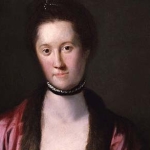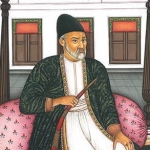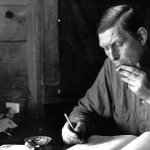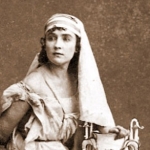For Marilyn who died in January
april 1
found on our driveway
like a feather dropped
by a crow
8 of spades,
a playing
card /
we played crazy Eights, slapping
cards or holding them
as if they were birds that might fly
out of our hands
decades ago, in our childhood
like the translucent, whirling
image I imagine, prismatic and phosphorescent —
a murmuration of starlings swooping
and iridescent
but it dissolved onto a gray wall, undecorated
/ glimpses of us wearing our
velvet Sunday best dresses, yours
usually crimson, mine blue
we never had nice shoes.
april 2
from Sri Lanka, popularly known here, before
Americans became tea drinkers, as
Orange Pekoe;
our mother hated
so many things —
tea was
rattlesnake venom to
her
I embraced it ///
What did you drink, Marilyn? I saw you only
with a Coke or a glass of wine in your hand?
Our mother whom you felt
damaged you / your life spirals, the twisting iridescent birds
fly at me now scintillating, spinning
I blink
(Our mother drank many cups of coffee with cream a day.)
Our sad mother
I blink
and tell it to go back to our childhood
of muddy little shoes from walking in
the spider-filled orange groves.
There, the damaging must have Begun / she
loving me so much
more
than you.
I wish there had been more stories
like the one about the origin of her disliking tea
at 17, she went to celebrate being made teacher
of the one-room school she had attended and
graduated from at her retiring teacher’s
being from a German coffee-drinking family.
Our mother hated it but politely choked it down.
Would never again touch a drop of the
poisonous beverage.
From that story, we learned that
our mother ritualized hating something — expected us
to admire her for it.
I took
that negative pattern
and spun it until I could have cloth enough
for an eloquent garment. Perhaps the lesson simply made you
feel yourself helpless ragged torn
I never
saw you that way, Marilyn,
though perhaps incomplete.
I pour a cup of Assam. Take a sip,
let it wash through my mouth,
down my age-damaged throat,
think
of you sitting
with me in your Southern California
backyard one May morning
next to the camellia bush.
I, as always with a cup of tea in my hand.
You, smoking.
I left all my family — you were part of it —
left California and reinvented myself, even
mythologized myself as a tan “California girl.”
You did not become an artist or a poet.
I suppose that’s why you felt damaged.
If only you knew how much imagination and sacrifice
it took for me to get away.
So many small things
can save us
from the damage
you talked of. For me, drinking that
first cup of Orange Pekoe
and making tea
my drink risking rattlesnake poison
with every steaming cup,
a tiny emblem of a rebellion I still try to practice.
You left us so quickly, Marilyn,
your house full of cancelled aspirations — glass
bowls, and cylinders, and huge globes
filled with sea scallop shells
you combed the California seashores to
find, collecting these empty shells, washed
free of their biological life. Out of the ocean:
we two different daughters of a sailor.
april 3
The spinning the scissors the measuring
and thus our lives are given out
from the heavens, with unfair allotments
and varied, unaccountable fates,
born when we are, and to whom
you would have prevailed
in an age where women had to spin,
weave the material, cut it into britches and dresses,
undergarments and sheets, sew
and keep clean, warm, and comfortable a
household full or a castle full / men
children, hired hands, maidservants — you would have
done it
so well.
But you would have died young in such a world —
diabetes, asthma, chronic bronchial infections
even in the 21st century where you lived to be
76 a world where all your skills were plied as
substitute
for being an artist.
When I asked you a year ago,
not knowing that you would die this January,
what you would most like to have, if
money were not the object
— since clearly all your measuring, cutting, and sewing
had been for economical reasons,
not art —
you thought for a bit, raising your chin.
“A swimming pool in my backyard. One I could
step into every morning, swim, float — maybe in the afternoon
I’d go for a dip. Many evenings, I think,” she said
to me. Longing for some ocean?
In our portrait,
if someone paints it, she will be
sitting in a scallop shell,
her many jars of seashells behind her head. I
will be invisible, except for the spinning
murmuration of birds that radiates
past me.
They read at her funeral, a poem from her journal
about lying on the beach,
the sand embracing her.
How much she loved it / felt safe,
felt released. Oh, Marilyn, all
those seashells emptied of their living
fleshy occupants. (the ugly parts that die and rot) now
glorious empty rooms
in which to live an imaginary life,
to decorate,
to create beauty,
spaces to live
a different life.
What is left but your desires, locked in glass, and
an image of you walking
your beloved beaches, hands
full of seashells, your
footprints measured, then quickly filled
with the tidal flow.
april 4
my spinning,
a whirlpool of faceted moving lights
Everything is Numbers!
down into a vortical glare that replaces
my own mind’s desire
Everything is Numbers! Everything is Numbers!
floating down
like the crow’s
onyx feather
the 8
of spades
random card
appearing
last week
over gravel
8 legs on a spider,
the arachnid so many people seem to
fear, yet I lose track of time, stare into the wall
or any space to replace real images with my imaginary
ones, some random spider, who spins my fate
Crazy Eights, the child card game Marilyn and I played
pieces of eight, the dollar of
pirate Spain — our childhood in Orange County
8, a vertical infinity sign
everything is numbers / your
fire opal that Daddy brought
to you from india, and our mother
paid a jeweler to set it
into a ring. You wore the ring
more than sixty years. I suppose it was
on your finger at death
spinning, spinning
to scintillate and iridesce
We never had nice shoes.
april 5
Easter Sunday. You and I always dyed
Easter eggs together, our mother busy at
her forty-hour-a-week bookkeeper’s job. I
was intrigued with the colors,
but they never turned out so bright when
coloring the eggs. You, the artist,
were interested in the designs
to transfer onto the eggs,
cartoons, bunnies,
chicks.
We kept our eggs
separated from each other,
put them in separate bowls, neither
caring for the other’s creation. Still we
felt connected, even joyful, on those few holiday projects.
Not enough to make us friends.
My unwillingness to be like our classmates
embarrassed you. You chose invisibility
in school, rather than being known as “Diane’s
sister.”
That unwillingness to be like others
was what made me a poet. So many little things, but that earlydecision
of yours, not to understand why I wanted to be weird,
is what made you make so
many other small choices, preventing you
from becoming an artist. “Look away,” our mother said to us,
when there were ugly things confronting us.
I could not do that. You blame
our mother, yet it was you who decided to look away,
even though it meant not seeing the whole world,
even if meant you didn’t become an artist.
poverty, of course, was the reason
we never had nice shoes.
april 6
All numbers have
disappeared
instead
there are mushrooms
fungi that has always seemed
more artful than tasty
Sipping a cup of tea / soothes me
as the mushrooms in a veloute sauce
never could.
I feel stymied / a rider
with no horse. I want only to watch
the stories unfold / the secret stories about why
you chose to marry and have children / why
I did not / the stories
I try to banish
blot out, replace with the diamond
dog. A murmuration of iridescent starlings,
and the spider of eight,
twirling on its silk line, projecting infinity art
is made when you subject yourself
to the unacceptable, then dredge
yourself out,
find a mineral replacement:
infinity
iridescer
irised feather
scintillater
a crystalline body whirls
releasing me from
the history, the stories it’s
so hard to tell.
Until recent years, my sister
and I either ignored or disliked each other.
We fought continuously as children.
I have in my wrist a black bump that
protrudes near a vein.
It’s the point of a pencil
that broke off and penetrated my wrist as we struggled
for the long yellow weapon.
A pencil, the weapon of a writer. But there was
no bleeding, no seeming-wound to be dressed.
We never told
our Mother, both too ashamed
of our brutality. I’ve never asked a doctor
about it, the pencil lead encapsulated
in my wrist. Nor ever spoken
of it to anyone.
I always wonder that so much must remain a secret?
Why
we never had nice shoes.
april 7
Young Marilyn, Old Marilyn.
there are places on this planet where
I find it hard to detect any beauty
therefore, silence
No nice shoes.
april 8
there is silence
april 9
Drinking
a blend of traditional
Darjeeling with a touch of Ceylon / this
tea takes me back to a Viennese visit, drinking
this very tea in the afternoon while my friend, Jonathan,
ate their famous Sacher torte.
The tea
seemed particularly aromatic —
“lightly scented with oil of bergamot
and a hint of genuine Bourbon vanilla.”
Wishing for the moment in the past to reappear. I didn’t know
the tea from the Sacher Hotel
was as famous as the cake
until I found in my Upton Tea catalogue
a listing for “Scented Darjeeling”
under the heading “Earl Grey Blends”
This tea,
any cup of tea!
Hard to believe. no! Sad to
think my Mother almost spat out her first taste
of tea.
What worldly thing must I touch to
bring Marilyn back into my
sedate life, my sister Marilyn who died in January?
Her hand — I’d like to imagine timidly touching her
hand — Marilyn’s hand.
Her right hand on which she wore the fire opal ring.
In that hand she’d be holding a cigarette.
Smoke and fire makes me think of her —
not water, though it was that Pacific ocean
filled with seashells
that she was in touch with. My old hands,
not really like hers at all. She had big hands for shaping things,
while mine are small, like birds.




















Comment form: